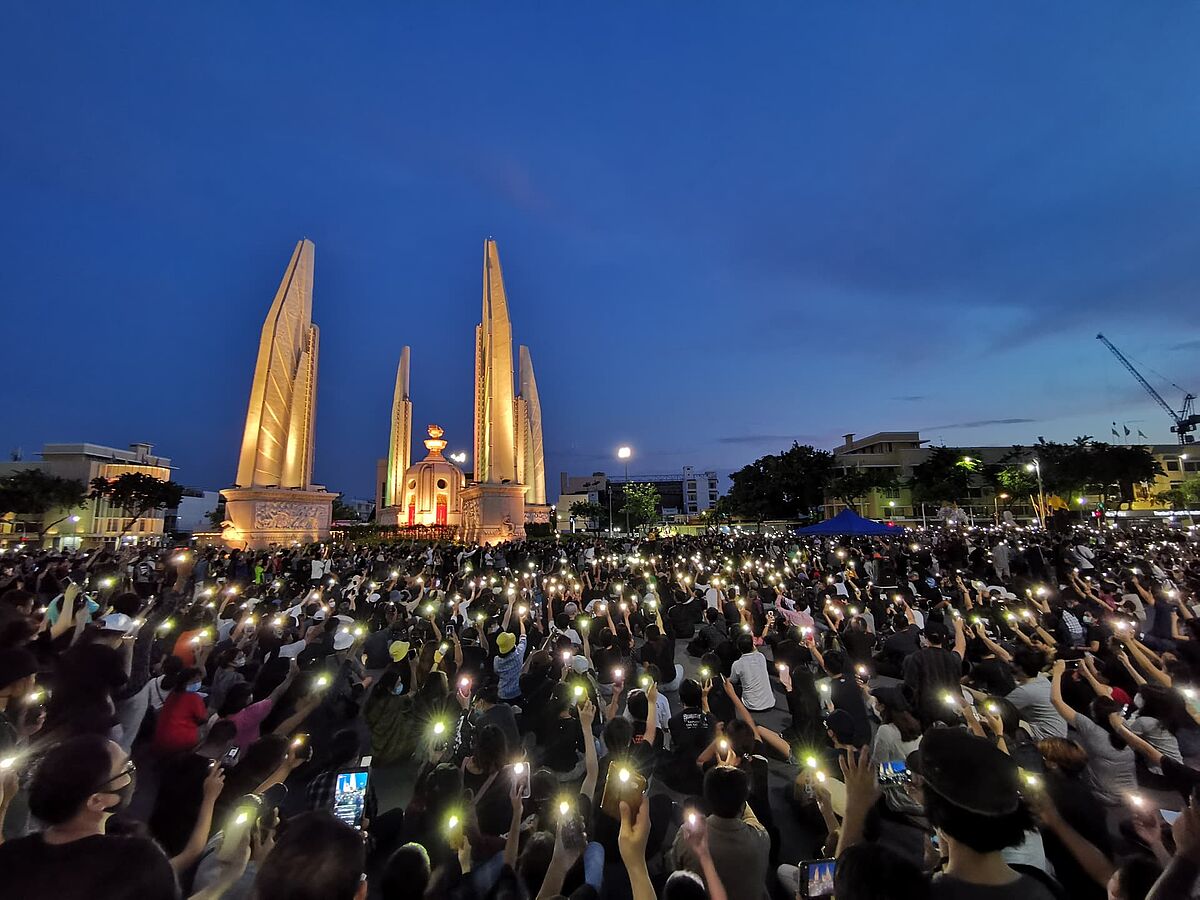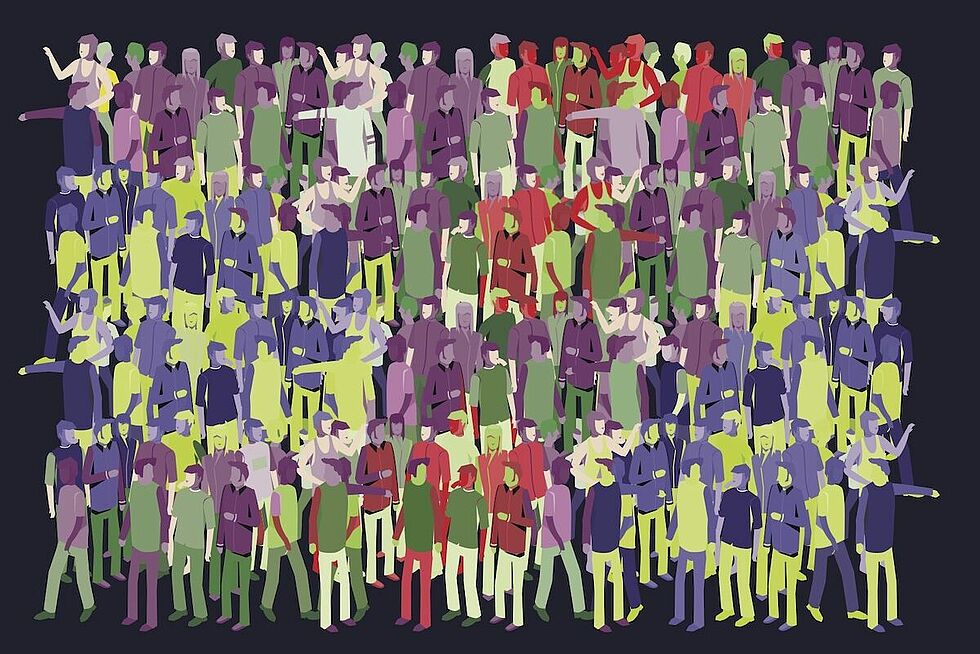Can the online tactics of Thailand’s political youth movement bring real change?

Thousands of anti-government protesters rallied in Thailand's capital in mid-July under the banner of three issues: to call for the resignation of the prime minister, an amendment to the military-written constitution, and an end to the intimidation of the people.
Chanting and waving signs, the 2,500 – 3,000 mainly younger Thais aged between 18 and 35, gathered at Bangkok's Democracy Monument. The protest was one of the largest street demonstrations since the 2014 military coup, ending the months of quiet streets in the wake of the COVID-19 pandemic. This event took place despite the ban on public gatherings under the Emergency Decree imposed in mid-March.
Behind these real-world events, a mass mobilization was happening online. The hashtag #FreeYouth, which referred to the name of the protest group, reached 8.77 million tweets, making it the highest trending hashtag on Twitter in Thailand on the day of the protest. In the following days, other trending hashtags indicated that young people still do not consider the country’s democratic system to be satisfactorily in place.
Social media is rising as the voice of youth calling for political change
Such social-movement hashtags trend rapidly in part because of young people’s belief that social media is the best platform to raise political issues, according to Pijitra Suppasawatgul, head of the Journalism and New Media Department at Chulalongkorn University's Faculty of Communication Arts. The youth do not have faith that the current political configuration can be effectively changed through formal channels in a short timeframe.
"Twitter has become the sphere where youth can at least speak out in public and shake up the political discourse."
The online political debate has shifted, she added. In the past, messages focused on the political polarization between the supporters of Thaksin Shinawatra, the ousted former Prime Minister, and conservative supporters. However, the trend has now shifted to highlighting oppression and more calls for Thailand's democracy, reform of the justice system, and change in the social norms that have long dominated Thai society.
Thailand has had two military coups in the last two decades. Conflicts between conservative and liberal elements of Thai society have brought recent political instability. Last year, the election held for the first time since the latest coup in 2014.
The impact of social media and online media to influence Thai politics was clearly felt at the March 2019 elections. The newly formed Future Forward Party (FFP), which eyed the youth vote, campaigned through social media and online. This new style of politics, which appealed to young, tech-savvy youth, resulted in FFP winning 81 seats, making it the third-largest party in the parliament.
However, just months after the new pro-military government was formed, allegations and charges were pressed against FFP core leaders. The hashtags #SaveThanathorn #SavePannika and #SavePiyabutr, referring to their names, appeared sporadically in social media in support. But then the social movement erupted after the party was dissolved in late January for violating election laws by accepting illegal loans from its leader. Hashtags and posts objecting to the ruling went viral, and students rallied in around 30 universities across the country.
Youth demonstration, then and now
Recent youth protests have taken on a different communication pattern to those of the past, said Surachanee Sriyai, a lecturer at Chulalongkorn University's Faculty of Political Sciences. Protestors are mainly spreading their message through online posts and social media instead of the leaflet distribution of protests in the 1970s.
Furthermore, netizens prefer to create anonymous accounts to voice their opinions and build movements, rather than reveal their real identities. Posts on Facebook and Twitter tend to be bilingual in Thai and English, to ensure local communication but also allow the international community to stay up to date. “This is the adoption of Hong Kong's youth movement," Surachanee said.
Can online demonstrations bring political change to Thailand in the real world?
The youth movement’s online initiatives have boosted public participation in political issues, but they have their limitations. Surachanee said street demonstrations still play a key role, and matter in building political momentum.
However, some observers have raised concerns that street protests may spiral out of control as they did leading up to the 1973 and 1976 massacres of activists at Thammasat University or the "Black May" incident in 1992. The mass protest against the military government resulted in the military crackdown that led to 52 confirmed deaths and the ongoing red-versus-yellow division over the past decade.
According to Surachanee, the student protests and red-versus-yellow cycle of unrest over the past decade offers lessons about violence. She speculated that state actors would be cautious about violent repression and would rather opt for less confrontational methods of law enforcement, including the continuation of the Emergency Decree and its ban on public gatherings, since young people have demonstrated a non-violent approach on their side.
Meanwhile, Yingcheep Atchanont, the Manager of the Internet Law Reform Dialogue (iLaw), echoed Surachanee's thoughts, arguing that offline protests would still be more impactful than online ones.
"Offline demonstrations are more effective in making change. But they can only succeed if there is a clearer process of group leadership formation, and if there is continuity in the fight itself."
Social media is an effective tool to help ignite mass mobilization. But this is just the beginning of a long struggle. The political movement requires unity, strategy, and a dialogue platform to move the country forward. It is not enough to remove the military-backed government's long reign, but a concrete vision of tomorrow is needed. Democracy is not a sprint; it is a marathon that requires a concrete plan, a practice, and more importantly patience.
About the author
Wasu Vipoosanapat is a Programme Manager at the Friedrich-Ebert-Stiftung Thailand Office.
About FES Connect
Connecting people, in the spirit of social democracy, we source and share content in English from the German and international network of the Friedrich-Ebert-Stiftung.



